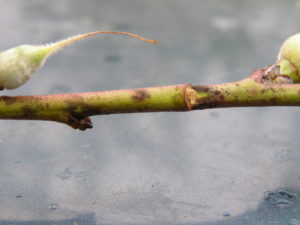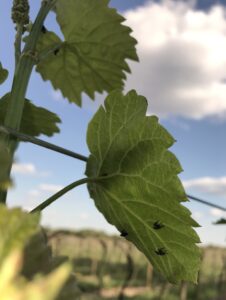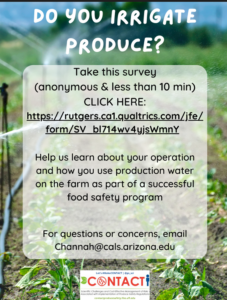Tree Fruit Phenology: Tree Fruit Phenology remains advanced in peach. In southern counties all peach orchards are shuck split to shuck off. Redhaven was at approximately full bloom on April 4. Red Delicious is at 90% petal fall. Sweet cherries are at about petal fall to shuck split depending on variety.
Peach:
Bacterial Spot: Generally we recommend starting at 0.5 ozs metallic copper and gradually lowering the rate as the season progresses. The rate applied will depend on the formulation. Dr. Lalancette published a chart listing common copper formulations and rates for peach and nectarine applications. Avoid combining copper with captan especially if it has been overcast for several days. Also avoid acidic spray solutions when applying copper. Dr. Lalancette has published a handy guide for copper applications in early covers. Antibiotics such as Mycoshield or Fireline may also be used and may offer slightly more residual activity during long wetting periods.
Peach Scab: In addition to Rusty Spot and Bacterial Spot, Peach Scab requires protective applications starting at petal fall. Peach scab cankers (Fig. 1) begin to expand at bloom and by shuck split begin to shed spores during wetting periods. Topsin, Topsin/Captan combinations, Flint Extra, Inspire Super, and especially Quadris Top applied at petal fall are the best materials for blocks that had scab last year. Quadris Top, Flint Extra or Topsin should be used at the high rate to suppress overwintering lesions on the wood. Quadris Top contains azoxystrobin which is phytotoxic to many apple varieties. Phytotoxic residues can remain in the tank for long periods after an application is made, even if a tank cleaner is used. Do not use Quadris Top or Abound in the same sprayer used for apples. Bravo (chlorothalonil) is also a good protectant that may be applied no later than shuck split. Captan is also helpful in cover sprays after shuck split where scab was troublesome last year.

Fig. 1 Peach Scab lesions on peach twig.
Oriental Fruit Moth: A biofix point for OFM was set on 4/10 in both northern and southern counties. The first of two insecticide timings for first generation Oriental Fruit Moth control fall at 170-200 degree days base 45 after biofix. This timing generally coincides with 100% petal fall in peaches. Timings are updated below. Do not apply insecticides until all bloom is off. No Insecticides for OFM are needed where Mating Disruption is implemented.
| OFM 1st Generation Timing | |||
| Insecticide Type | |||
| County/Region | Degree Days by 4/25 base 45 | Conventional
170-200, 350-375 |
Diamide
100-150, 300-350 |
| Gloucester – Southern | 224 | 1st –4/20-4/22
2nd –5/8-5/10 |
1st –4/15-4/19
2nd –5/3-5/8 |
| Middlesex – Northern | 219 | 1st –4/20-4/22
2nd –5/8-5/10 |
1st –4/15-4/18
2nd –5/3-5/8 |
Green Peach Aphid: GPA colonies begin forming sometime during bloom. Examine trees for the presence of colonies from pink to shuck split. Count the number of colonies on ten trees and use a treatment threshold of 2 colonies/tree at petal fall for peach, and 1 colony/tree for nectarine. The best way to scout for aphids during bloom is with a beating tray. Blossoms may also be collected, opened, and examined for the presence of aphids using a hand lens. This is particularly important for nectarine blocks. Check 10 trees per block with the beating tray. Collect 50 blossoms per block and examine for the presence of aphids. If more than 1 colony of aphids are found in nectarines, or 2-3 colonies are found in peaches, an insecticide for aphids will be needed when all petals are off. See the NJ Commercial Tree Fruit Production Guide for recommended materials and rates. Aphid colonies are now visible in southern county orchards.
Plum Curculio; Tarnished Plant Bugs; and Other Catfacing Insects: Plum Curculio start to move into orchards at about 88-100 degree days base 50 after January 1. Applications for PC should be initiated once all petals are off, with a second application made with ovicidal materials at 379-402 DD. Currently we have accumulated about 258 DD base 50 in southern counties, and 208 DD base 50 in northern counties. Growers can monitor degree day development at their site by finding the nearest weather station and using the degree day development tool at NEWA. Catfacing insects are starting activity, but will become more of an issue as temperatures warm and mowing and other ground cover activities become more common. Insecticides for catfacing insects are not recommended until after all petals are off.
Scale Insects: Dormant oil applications are standard recommendations for scale control but in some years when conditions are not optimal for oil application scale control may be less than desired. Where oil was not applied or in orchards and where scale is a recurring problem, an application of Movento between petal fall and shuck split should “clean up” problem blocks. Movento should be applied at 6-9 ozs./ac. A penetrant must be included as per the product label. Movento will also control green peach aphid when used at this timing.
Lesser and Greater Peach Tree Borers: Growers using mating disruption for borer control can begin placing dispensers around the end of April and should have them in place by mid-May.
Apples and Pears:
Diseases: Fire Blight, Apple Scab, Rust diseases, and Powdery Mildew are the main targets at this stage. The NEWA apple scab model is estimating about 93% ascospore maturity as of 4/25 in southern NJ with 81% of cumulative ascospores discharged. Northern counties were at Green tip on or about 4/3. The model estimates about 64% ascopsore maturity for Northern Counties with 52% ascospores released. Primary apple scab spores are released during any substantial infection period. More information can be found in this blogpost from Penn State. Between tight cluster and first cover include products effective for powdery mildew and cedar apple rust. To manage Fire Blight in both apples and pears, consider using Kasumin at bloom. Kasumin is an antibiotic like Streptomycin and Oxytetratracycline. It contains Kasugamycin which is a different chemistry. Kasumin is only labeled for bloom and petal fall applications while strep and oxytet are labeled for post bloom use. Using 3 different chemistries in rotation allows for resistance management while extending the protection into the post bloom period when late blossoms typically appear which ever material you use, the addition of Actigard or other plant defense elicitors may improve control.
Rust Diseases: The two most common rust diseases that affect pome fruit are Quince Rust and Cedar Apple Rust. In some years these diseases can be troublesome in commercial orchards. Most disease control programs for scab will also control rust. In organically managed blocks in the east options are limited for approved materials that are effective for rust. Potassium Bicarbonate products have shown good efficacy for rust diseases in trials performed in Virginia. Organic growers should seek out and plant rust resistant cultivars. Cultural controls are not practicable due to the widespread presence of alternate host Junipers both wild and cultivated. Rust disease development on junipers should now be producing large spore releases during wetting periods. See this link for pictures of rust on pome fruit and juniper.
Codling Moth (CM): The first codling moth flight has started. A biofix was set for CM on April 17th in southern counties. No biofix has yet been set for northern counties.
| Codling Moth Degree Day Timing | ||||||||
| Application and Insecticide Type | ||||||||
| County Area | Biofix | Rimon:
75-100DD + 14-17 days later
|
Intrepid
150 + 450 DD Diamides – Altacor, Voliam mixes: (150-200 DD) |
Cyd-X, Carpovirusine
250 DD + every 7-9 days during brood hatch (later if first spray is an IGR) |
Standard Insecticides – Delegate, Avaunt, OP’s, carbamates, pyrethroids
250 DD + 550 DD
|
|||
| DD | 75 | 100 | 150 | 450 | 250 | 250 | 550 | |
| Southern | April 17 | 4/29 | 5/2 | 5/7 | Too far off | 5/17 | 5/17 | Too far off |
| Northern | ||||||||
Rosy Apple Aphid: If a pre-bloom application was not made, monitor for colonies during bloom and use a treatment threshold of 1 colony/tree at petal fall. Some orchards have colonies that require treatment in southern counties.
Pear Psylla: Dormant oil applications should have already been started to deter psylla egg laying. At the green cluster stage a pyrethroid is generally included with oil to knock down adults migrating into the orchard. In lieu of oil, Surround may also be applied starting at swollen bud and continued through petal fall. If using Surround through the bloom period stop at petal fall and switch to applications of 1% summer oil @ 1gal/ac in no less than 150 gals/ac. these should be made at no more than 2 week intervals. At petal fall insecticide options for Psylla control include Actara, Assail, Belay, Movento, Sivanto Prime, and Agri-mek. See the NJ Commercial Tree Fruit Production Guide for recommended materials and rates.
Pear Diseases: Include effective materials such as Ziram or EBDC formulations for Pear Scab and Rust diseases beginning at the cluster bud stage. At white bud use products effective for pear scab, rusts, and fabrea leaf spot. For both apples and pears, consider using Kasumin at bloom. Kasumin is an antibiotic like Streptomycin and Oxytetratracycline. It contains Kasugamycin which is a different chemistry. Kasumin is only labeled for bloom and petal fall applications while strep and oxytet are labeled for post bloom use. Using 3 different chemistries in rotation allows for resistance management while extending the protection into the post bloom period when late blossoms typically appear. which ever material you use, the addition of Actigard or other plant defense elicitors may improve control.
Grapes: The most important diseases to manage at this time are Phomopsis and Powdery Mildew. At 3″ growth start managing for Black Rot. More information about early season disease control can be found in this blogpost from Virginia Tech. Insect pests to monitor are Grape Flea Beetle, and Climbing Cutworms. Controls for these insects are rarely needed. If control is determined to be necessary, use one of the materials recommended in the New Jersey Commercial Grape Production Guide. SLF hatch began in southern counties sometime last week. (Fig. 2). There is no need to control SLF at this time.
| STLM | TABM-A | CM | BMSB | OFM-A | DWB | OFM-P | TABM-P | LPTB | PTB | |
| 4/15/2023 | 433 | 20 | 1 | |||||||
| 4/23/2023 | 423 | 1 | 13 | 8 | 0 |
Tree Fruit Trap Captures – Northern Counties
| STLM | TABM-A | CM | BMSB | OFM-A | DWB | OFM-P | TABM-P | LPTB | PTB | |
| 4/8/2023 | 10 | |||||||||
| 4/15/2023 | 20 | 3 |
Phenology Table: Based on annual observations made in Gloucester County.
| Pest Event or Growth Stage | Approximate Date | 2023 Observed Date |
| Bud Swell (Redhaven) | March 23 +/- 15 Days | March 7 |
| 1/4″ Green Tip Red Delicious | March 31 +/- 13 Days | March 27 |
| Pink Peach (Redhaven) | April 4 +/- 15 Days | March 24 |
| Tight Cluster Red Delicious | April 9 +/- 13 Days | April 7 |
| Full Bloom Peach (Redhaven) | April 9 +/- 14 Days | April 4 |
| Pink Apple (Red Delicious) | April 14 +/- 12 Days | April 11 |
| Full Bloom Apple (Red Delicious) | April 22 +/- 11 Days | April 16 |
| Petal Fall (Redhaven) | April 22 +/- 10 Days | April 15 |
| Petal Fall (Red Delicious) | April 27 +/- 13 Days | |
| Shuck Split (Redhaven) | April 30 +/- 11 Days | April 21 |
| Pit Hardening | June 15 +/- 9 Days |


